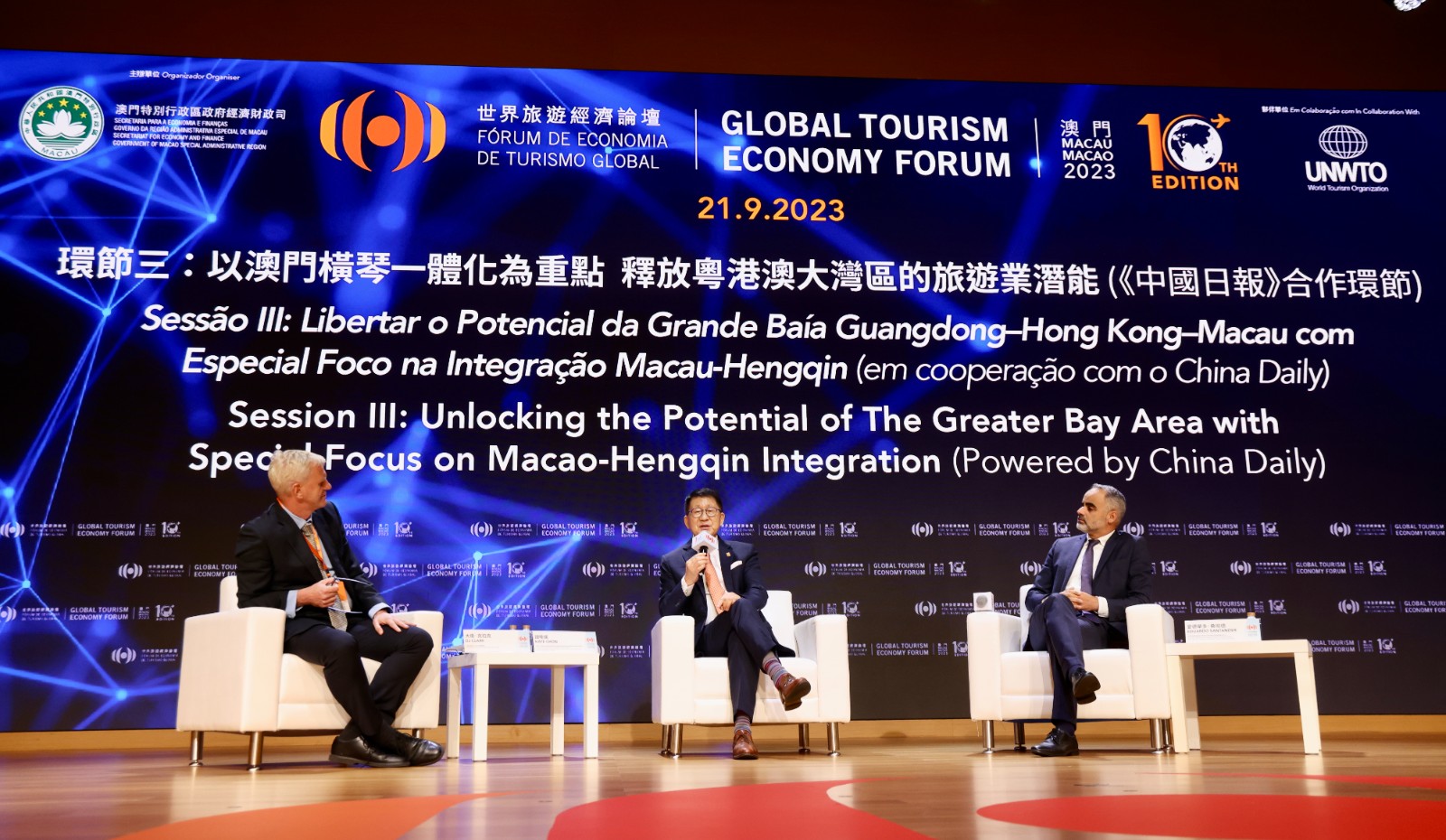2023-09-22
Liu Yifan and Zhang Tianyuan in Macao

Tourism business luminaries and scholars voiced their expectations of a tourism boom in the Guangdong-Hong Kong-Macao Greater Bay Area and called for greater efforts and cooperation to address headwinds at the Global Tourism Economy Forum in Macao on Thursday. Chen Yin, chairman of the China Tourism Group Corp, said the tourism sector in the Greater Bay Area is showing strong growth given its economic strength and abundant tourism resources. “The Greater Bay Area is one of the most open and economically vibrant regions in China. It boasts high per capita disposable income and consumption levels, ranking among the top in the country,” Chen told a session powered by China Daily. With a population of 87 million, the Greater Bay Area’s economic output topped 13 trillion yuan ($1.78 trillion) in 2022 — 2.8 trillion yuan more than in 2017 — data from Guangdong’s Development and Reform Commission show. Among the initiatives highlighted in the GBA’s blueprint, promulgated in February 2019, was a culture and tourism development plan, which is part of efforts to develop the region into an exchange hub for the cultures of the East and the West and a world-class tourism destination. “The Greater Bay Area is endowed with abundant tourism resources, including ecoresorts, coastal leisure destinations, urban tourism, and theme parks. It serves as an important source of tourists as well as a popular travel destination for individuals, holding a significant position in both the national and global tourism industry chains,” he said. According to Chen, the Greater Bay Area receives nearly 400 million tourists annually, generating tourism revenue of over 1.2 trillion yuan. “Recent data, such as the May Day holiday figures, indicate that the number of visitors to the six green city clusters, including Shenzhen and Guangzhou, has already returned to pre-pandemic levels,” he added. Complementary strengths Kaye Chon Kye-sung, dean and chair professor and Walter and Wendy Kwok Family Foundation professor in international hospitality management at the School of Hotel and Tourism Management of the Hong Kong Polytechnic University, said the GBA boasts great advantages to boost its tourism sector as the three main areas, namely Guangdong province, Hong Kong and Macao, have their unique offerings. “Hong Kong is known for the East-meets-West culture and has a very long history of being Asia’s world city, while Macao is an entertainment and recreational destination with a unique combination of Portuguese flavors,” Chon said, adding that Guangdong’s cuisines and attractions are great selling points. Nevertheless, more efforts are needed to deal with the sector’s labor shortage and facilitate seamless travel within the city cluster, the professor said. Acknowledging that the equilibrium between labor supply and demand had broken down during the pandemic, Chon said there are many ways for cities in the Greater Bay Area to work together. For instance, Hong Kong, which suffered from a labor crunch in recent years, can access a great pool of labor from Guangdong, Chon said. He also cited his firsthand experience in crossing the border, saying the process to enter the Chinese mainland from Hong Kong is more complicated than going in the other direction. “So, I think we have to make sure there will be a more seamless integration of travel among the three major destinations,” Chon added. Tourism as a lifestyle Eduardo Santander, executive director of the European Travel Commission and honorary vice-chairman of the GTEF, shared his insights on how Europe has enjoyed remarkable growth through cooperation. “Education plays a crucial role in this process. It is essential to educate both the demand and supply sides of tourism. “On the demand side, showcasing the area’s attractions, infrastructure, and ease of travel, including visa processes and currency acceptance, is vital. On the supply side, preparing the local population to cater to foreign visitors by providing language skills, appropriate signage, and cultural sensitivity is essential,” he said. In Europe, the focus is shifting from quantity to quality in terms of tourism success. Striking a balance between filling accommodations and preserving the local community’s well-being is crucial, Santander noted. It is advisable for the Greater Bay Area to learn from experience and focus on developing in response to demand, he said. Santander said that understanding the Greater Bay Area’s links to various parts of the world, including Asia, Europe, and North America, should guide the tourism development approach. Experts have said that striking a balance between an influx of tourists and mitigating the negative effects on local people’s lives is crucial for driving growth of the tourism sector. Santander highlighted the importance of encouraging people to view tourism as an economic livelihood as well as an integral part of their lives, where they can enjoy cultural exchanges. When talking about the Guangdong-Macao In-Depth Cooperation Zone in Hengqin, he said the major advantage of the zone in developing tourism lies in its sophisticated infrastructure. “The railways and planes are already in place, so I believe the primary hurdle has been overcome. The groundwork has already been completed.” The zone, which spans 106.46 square kilometers, focuses on high-tech development and manufacturing industries, offering tax rebates for enterprises and individuals.